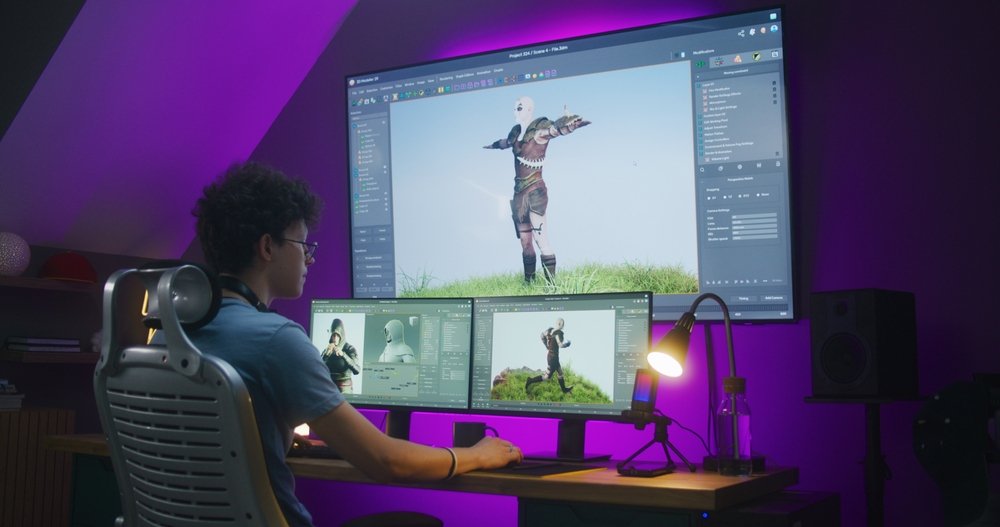Not everyone learns the same way. That is why, a one size fits all approach to education seems to be on its way out.
The traditional classroom method was the accepted way of teaching/learning but a lot has changed with the advent of new technologies. This change experienced a boom when the world faced COVID-19 and the lockdowns. Now, more interactive, technological mediums are being adopted to educate people of all ages.
It works well too!
Games as a tool for education have been excellent in improving student learning, promoting participation, motivating students to take risks, and ironically enough, fostering social and emotional learning.
This has been especially beneficial to students with a learning disability like ADHD or dyslexia. It also expanded the accessibility of education to the more remote areas.
On the business front, the gamified education industry is projected to grow at an eye-watering yearly rate of 32% between 2023 and 2030. From $840.4 million in 2023, its market value is expected to reach $10.25 billion by 2030.
In this article, we take you on a journey through this tool and exciting new venture that is looking to revolutionize education as we know it today. Every game development studio has the opportunity to break into these new industries through gamification.
Moreover, we also focus on how they are being used to bring awareness to global issues that impact some or all human beings.
Gamification of Learning
‘Edutainment’ is the next big thing.
By merging the gaming design and game mechanics with academic content, educators can develop deep engagement in students with their class.
These gamified learning environments are exceptional in their ability to captivate attention and encourage participation, problem-solving, and critical thinking.
For students, each class becomes a quest where they can apply their knowledge and skills to solve problems and achieve objectives. The experience they earn helps them level up. This provides important feedback and positive reinforcement which encourages them to keep learning.
Moreover, these educational games can be personalized. They can adapt to individual learning styles, allowing students to progress/learn at a pace that is comfortable for them.
Promoting Empathy and Social Awareness
Games that employ storytelling, work very well in developing empathy and social awareness. People begin to interact with diverse narratives. This helps them put themselves in the shoes of characters from varied backgrounds, cultures, and circumstances.
Important issues like discrimination, mental health, and environmental sustainability can be better taught if the ‘player’ can form a bond with the characters. This allows them to reflect on their biases and actions. This is critical to challenge stereotypes, spark meaningful conversations, and inspire positive social change.
Let us see some examples.
This War of Mine puts you in the shoes of civilians trapped in a war-torn city, forcing them to make difficult moral choices to ensure their survival (Sophie’s choice but now you’re Sophie).
In another example, the game Life is Strange gives you the opportunity to intimately deal with themes of friendship, identity, and mental health.
Community Building and Collective Action
Games, especially online multiplayer games allow people from all across the world to come together and engage in a shared experience. This develops in them better communication skills and collaboration.
Moreover, it fosters a sense of community and camaraderie that goes beyond the game. The community extends beyond the game into social media platforms, forums, and live streaming channels, where players connect, share experiences, and organize events.
From fundraising initiatives to volunteer efforts and advocacy campaigns, the positive impact that gaming communities can have is only limited by one’s imagination.
Addressing Global Challenges
Gamifying complex problems encourages players to participate in finding a solution. This could very well be the catalyst to educate, raise awareness, and inspire action on issues ranging from climate change to public health crises.
Let’s look at some examples.
Foldit is a puzzle game. In the game you can fold proteins. With enough people playing and enough gameplays, it could lead to scientific breakthroughs in disease research. This could be influential in treating diseases like cancer and Alzheimer’s.
Pandemic simulates the spread of infectious diseases. You are incentivized to develop strategies with others to contain the spread of the diseases and save lives.
Conclusion
Video games, although generally the butt of jokes from ‘old people,’ can and do have a very positive impact on the real world. From building a community, solving problems together, raising awareness on social and other global issues, they can change our society for the better.
The world is ready for games as a tool for education.
So, we encourage you to turn on your PC or console, put on your headphones, get some snacks, and change the world, one click at a time.
We also encourage you to take a helping hand from experienced game development companies.
EDIIIE is a 3D game development company with a proven record in gamification of otherwise ‘normal’ activities and processes. Connect with us if you have an idea that you wish to gamify!
